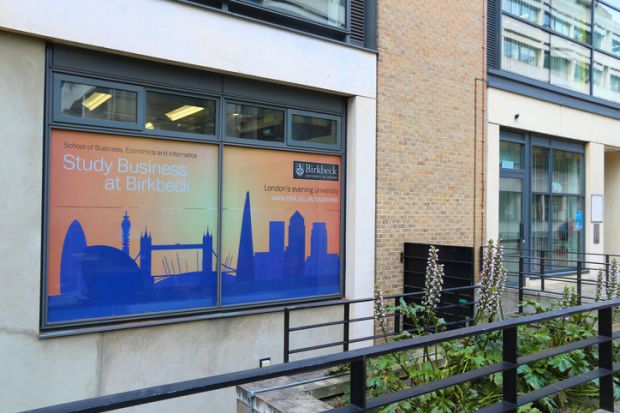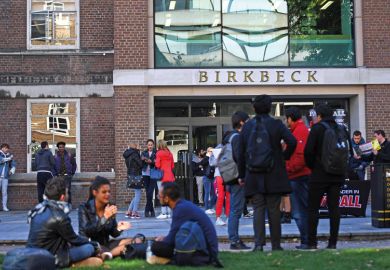Next month, Birkbeck, University of London enters its 200th year. The institution has a remarkable history. Always demand-led, its original curriculum was determined by the payments its adult students paid directly to lecturers for the subjects they wanted to learn. Nor did becoming a University of London college in 1920 alter Birkbeck’s vital but unconventional model of making teaching and research accessible to all working Londoners via part-time and evening classes.
The college has a strong track record of recruiting undergraduates from some of London’s most disadvantaged communities, contributing to one of the most diverse student bodies of any English university and boosting social mobility. It also has a strong track record of innovating in response to changing need. It has pioneered flexible master’s degrees, for instance. It has developed student spaces that support high-tech teaching, reducing reliance on hired facilities. And it has consolidated its estate around Bloomsbury by disposing of outlying or dated properties.
As Birkbeck moves into its third century, it stands at another moment of reinvention, amid changes in the patterns of work, domesticity and education that underpinned its historic model.
It is in line with the college’s socially engaged ethos that this moment is one of impassioned debate. But it is vital that the debate is based on an understanding of what is being proposed – and why.
Last year, the college’s governors agreed a five-year strategy that was developed following extensive consultation and analysis in the wake of the pandemic. Predicated on the need to renew Birkbeck’s historic egalitarian mission, the strategy draws on a range of initiatives – such as our foundation year and digital education strategy – that were launched after the Brexit referendum in anticipation of declines in the large number of European nationals previously working in the south-east of England.
The strategy proposes moving towards a flexible blend of campus and digital experience, designed to give a diverse student community the opportunities it craves.
Alongside this new teaching model, we are reviewing our academic organisation and portfolio, addressing changes in the subjects that students want to study. We are moving academic areas into larger faculties and departments that match up with emerging areas of enquiry. This will reduce management overheads and ensure greater parity in staff-student ratios and workloads across the institution. No subject areas are being closed.
However, making difficult decisions about how to prioritise finite resources and apply existing strengths to emerging demands is challenging at a moment of sector-wide demographic, financial and policy pressure – and in the context of a funding and regulatory system that is slanted against Birkbeck’s mission.
Like others, Birkbeck has weathered the ongoing freeze in the domestic undergraduate tuition fee, which has reduced by a third in real-terms value since 2012. Like others with an access mission, Birkbeck has seen its recruitment disproportionately hit by the removal of the student number controls in 2015/16. But it has also been particularly exposed to the catastrophic nationwide decline in part-time and mature student numbers that has resulted from poor maintenance support and older students’ aversion to the debt associated with higher fees.
This strain means that in delivering the changes Birkbeck needs to make, job losses may be necessary. We are committed to achieving these through voluntary means where possible, but we have made clear that no measures can be ruled out.
Ultimately, structural challenges require structural responses. England needs a higher education sector that maintains diversity in excellence and acknowledges the value of variety in institutional size, shape and mission. Student choice needs to be supported by cross-sector measures to preserve capacity and support staff in the institutions most destabilised by the decade-long decline in part-time and adult learners and by the changing trends in student number flows more generally.
This is not the only issue that policymakers need to be honest about. A sustainable higher education funding system needs to strike a whole series of delicate balances – and it is clear these are not being achieved in England. Other examples include meeting ever-growing demand for university places and delivering the social benefits of wider access while maintaining the level of teaching resource. And how do we ensure value for public money without imposing an excessive regulatory burden, which creates unnecessary overheads, undermines institutional autonomy and discriminates against those doing the heavy lifting on access?
Birkbeck has high hopes for the lifelong loan entitlement, which promises to offer people the equivalent of four years of post-18 education to use over their lifetime. This aligns closely with our new model, providing the flexibility and support that part-time students need. But since the entitlement will not begin until 2025, we can’t rely on it to overcome current challenges
As an institution, Birkbeck is delivering on the government’s policy imperatives around lifelong learning and widening participation. A system that does not offer appropriate funding incentives for us to do so is a system in need of fundamental revision.
David Latchman is vice-chancellor and Matthew Innes is deputy vice-chancellor of Birkbeck, University of London.
Register to continue
Why register?
- Registration is free and only takes a moment
- Once registered, you can read 3 articles a month
- Sign up for our newsletter
Subscribe
Or subscribe for unlimited access to:
- Unlimited access to news, views, insights & reviews
- Digital editions
- Digital access to THE’s university and college rankings analysis
Already registered or a current subscriber?








